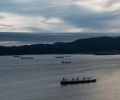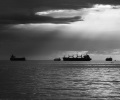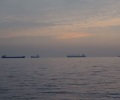Russia’s stealth tanker fleet refueling in European waters as EU mulls new curbs

Russia’s growing fleet of “shadow” tankers transporting its oil outside the G7’s price cap mechanism is being refueled in European waters, according to tanker tracking data, amid fresh calls to further clamp down on rampant evasion of sanctions designed to hit Moscow’s oil revenues.
At least 3,100 refueling, or bunkering, operations involving shadow tankers were observed off European member states the UK, and Norway over the 12 months to April 30, according to S&P Global Commodities at Sea data. Waters off Malta and Greece saw the greatest shadow fleet bunkering activity, making up 45% of the total observed activity which averages around nine tankers per day, according to CAS.
Often made up of aging vessels with murky ownership and Russian-backed insurance, the shadow fleet has ballooned to make up more than 10% of the global tanker fleet and accounts for almost 70% of all seaborne Russian crude trade, according to S&P Global data. In April, almost 600 crude and product tankers were either confirmed by Western authorities to have violated sanctions or were at high risk of breaching them, according to a joint study by S&P Global Commodity Insights and S&P Global Market Intelligence.
The practice of refueling tankers carrying Russian oil is not currently prohibited in EU ports or territorial waters as long as the crude or oil products were purchased below the price cap and are en route to a third country. At-sea bunkering activity in international waters adjacent to European territorial waters are not covered by the price cap regime and it is unclear whether the shadow tankers were engaged in illicit oil trade when the bunkering activity was logged.
But increasing public scrutiny over the growth of “grey” Russian oil trade and Moscow’s ability to market its oil is creating challenges for policymakers in Brussels and the US as they struggle to rein in Russia’s ability to fund its war in Ukraine.
Russia’s Urals crude traded well above the G7’s $60/b price cap during the second half of 2023 and last dipped under the cap in early February, according to Platts, a part of S&P Global Commodity Insights. Urals loaded at Primorsk was assessed by Platts at a $16.55/b discount to the Mediterranean Dated Brent Strip on May 7, compared to a Ukraine war low of $12/b in October 2023.
Shipping clampdown
Last month, the operations of a Latvian-based marine bunkering company supplying fuels to tankers in the Baltic Sea off Sweden caught the attention of Greenpeace. The environmental group launched a protest against Zircone, a bunkering tanker owned by Fast Bunkering it claimed had been fueling shadow tankers in the Swedish Exclusive Economic Zone off the Swedish island of Gotland in the Baltic Sea.
Rejecting the Greenpeace claims, Fast Bunkering said it does not supply shadow tankers, supply fuel of Russian origin, cooperate with Russia and complies with all Russia-related sanctions.
Although Sweden has not commented on the Greenpeace claims, the EU member state recently highlighted the security and environmental risks of shadow tankers while pushing for tougher sanctions on such ships at the EU level. Sweden’s foreign minister Tobias Billstrom has suggested that EU should tighten rules for shadow trades as those ships tend to be old and less insured.
Isaac Levi, a policy analyst at the nonprofit Centre for Research on Energy and Clean Air, said EU regulators should expand the sanctions rules to ban bunkering ships transporting Russian oil.
“By offering bunkering services to ‘shadow’ tankers that often have no or dubious insurance to transport Russia’s oil across the globe, these nations are aiding environmentally risky tankers to boost Russia’s export earnings,” Levi said.
The G7 price cap currently allows the trading, brokering, transport and other related services by EU operators to support critical energy supply to third countries. But curbing the rising grey market Russian oil trade circumventing the G7’s price cap remains a key target for EU sanctions.
The European Commission wants to ban EU ports from assisting vessels participating in “energy transport contrary to the objective of reducing Russia’s revenue in this sector,” Politico reported May 7 citing a draft proposal for the EU’s 14th sanctions package against Russia. Under the sanctions update, the proposal also suggests barring such ships from receiving EU services or financial assistance.
Source: Platts

 Hellenic Shipping News Worldwide Hellenic Shipping News Worldwide, Online Daily Newspaper on Hellenic and International Shipping
Hellenic Shipping News Worldwide Hellenic Shipping News Worldwide, Online Daily Newspaper on Hellenic and International Shipping





















 PG-Software
PG-Software